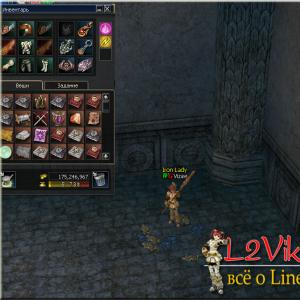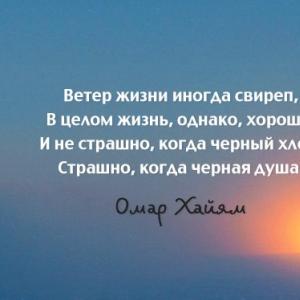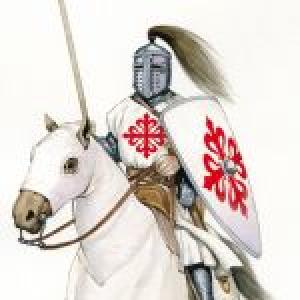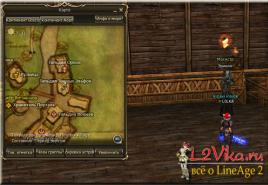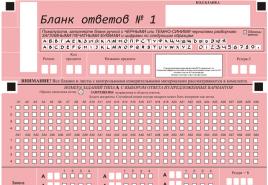Topics for self-education of educators cognitive research work. Plan for self-education on the topic: “Cognitive and research activities
Department of Education of the City of Moscow
Southeast District Office of Education
State budget educational institution
Education Center No. 000
Preschool department "Sagittarius"
TOPIC OF SELF-EDUCATION
"Cognitive development of children of senior preschool age"
Performed:
Group teacher No. 5
Direction: Cognitive and speech.
Educational field: Cognitive development
Starting the work on self-education, I set myself:
Purpose: To improve my professional level; to systematize work on the formation of cognitive knowledge and skills in older children; to create optimal conditions for a preschool child as the basis for cognitive, intellectual, personal, and creative development.
Tasks:
- Creation of conditions for the formation of cognitive competence in children;
- familiarization of children in a form appropriate to their age with cognitive experimentation; - development in children of interest in experimentation; - assistance to the process of formation in children of a sense of responsibility in practical activities;
- providing necessary assistance to families in matters of cognitive education of children. To confirm the expediency of conducting such classes by educators.
The techniques used in the formation of cognitive development are traditional:
Visual - observations, looking at pictures, showing films, slides,
presentations.
Practical - exercises, games, experiments and experiments, modeling, design
Verbal - a story, reading, questions, conversations, the use of an artistic word.
Expected Result.
Cognitive development is one of the most important sections of preschool pedagogy and it is aimed at the mental. The better the children are organized, the higher the guarantees for the success of schooling.
Continuous work in this area was carried out on the basis of long-term planning, compiled by me for the year.
Work with children.
September
1 "What is "knowledge" and "to know"? To introduce children to the concepts of "Knowledge, to know." To develop interest in cognitive activity. To contribute to the education of a creative personality.
2. "Everyone has a name." Formation of ideas about the name, traditions of naming people in accordance with the age and role of the name in human life. Name, names, surname, patronymic, age
October
1. "Family - seven I". To deepen children's ideas about family well-being and the protection of the rights of the child by family members. Well-being, friendly family, relatives, love, care, respect, protection, duties, rights
2. "Away is good, but home is better." Formation of ideas about human needs in housing and the right to housing. House, apartment, rooms, residents, order, disorder, food, shop, money.
1. "Who lives where?". Familiarization of children with different countries and peoples Country, peoples, geographical map, foreign, nationality, race, faith, similarities, differences.
2. "My Motherland". Formation of ideas about one's country, the main city of Russia and respect for one's small motherland. Country, homeland, Russia. Russians, capital, city, flag, coat of arms, territory.
December
1. "Do I want or need to?" The development of independence and responsibility, the formation of skills for joint activities, Help, deed, care, care, resentment, forgiveness, friendship, friend, friendly, sympathy.
2. "It is bad for him who does no good to anyone." Formation of a respectful attitude of children towards each other and the skills of conflict-free behavior and communication. Resentment, quarrel, bad deed, evil, good, evil, greed, generosity.
January
1. "What you do not like in another, do not do it yourself." Consolidation of elementary rules of behavior in kindergarten, the formation of skills of polite treatment and behavior. Respect, patience, attention, understanding, rules, kind, polite, attentive, sympathetic, not greedy.
2. "Secrets". Familiarization with the rules of polite attitude towards other people and the formation of polite treatment skills in children. Respect, rules, politeness, you, you, nickname, mockery, polite words, goodbye, hello, etc.
February
1. "Children and adults". Deepening ideas about the differences between people of different sex and age and their social roles. Boy, girl, aunt, uncle, old man, old woman, age, help, care.
2. "Life is given for good deeds." Cultivating a positive attitude towards people. Respect, age, elderly, old age, childhood, help, good deeds.
1. "How to be friends without a quarrel." Formation of skills of conflict-free behavior and communication in children. Good, evil, resentment, deceit, punishment, experience, upset.
2. "I will stand for my own, but I will not take someone else's." Formation of ideas about property, personal things. Personal things, common things, someone else's, one's own, punishment, harm, taking other people's things without permission (stealing).
April
1. "Work and rest". Familiarize yourself with the right to work and rest. To consolidate the understanding that each person needs both work and rest Labor, work, help, duties, rest, child labor, adult labor.
2. "Learning to learn is always useful." To expand children's understanding of the role of education in the life of every person. Knowledge, learning, education, literate.
1. "Every little child should know this from the cradle." Formation in children of skills of safe behavior with adults and peers in public places Rules, violator, criminal, safety, attention, forbidden, death, injury.
Diagnostics of the level of knowledge and skills development by children
Working with parents.
September
Campaign "Lessons of family and family values"
October
Folder - shift "Children's Rights"
November
Questionnaire "Do you understand your child"
December
Reward and Punishment - Eight Rules for Adults
January
Consultation "Children's lies for and against"
February
Child abuse memo
March, April
Collection "Cognitive development of older preschoolers"
May
Parent survey.
Self-realization.
Participation in the system of methodological work in the preschool educational institution. Preparation and conduct of an open lesson - as a form of summing up the final general activity.
Open lesson on the topic, introspection of the lesson.
Literature study:
one. . Teacher and family. –M.:. – Ed. House "Karapuz", 2001
2. Dybina and the world around. Program and . - M .: Mosaic - synthesis, 2005.
3.Dybina with subject and social environment. The system of work in the senior group of kindergarten. -M.: Mosaic - synthesis, 2012
4., Ogneva senior preschoolers with the Convention on the Rights of the Child. - M .: "Publishing house Skriporii 2003", 2005.
5. Sankina of the objective world. - Volgograd: Teacher, 2009
6. Chernyakova work in the preschool educational institution. Toolkit. - M .: TC "Sphere", 2010
7. Shorygina about good and bad behavior. - M .: TTs Sphere, 2007.
Nelli Ivanovna Bukina
"Cognitive development of children of senior preschool age". Self-education work plan
Work plan for self-education of the educator of the senior group. 2017 -2018 academic year.
MDOU "Ryazhsky Kindergarten No. 8" Bukina N.I.
Topic: « Cognitive development of children of senior preschool age.
Direction:Cognitive speech.
Educational area:Cognition.
Target: Improve your professional level; systematize work on the formation of cognitive knowledge and skills in older children.
Tasks:
Creation of conditions for the formation of children cognitive competence;
Familiarization children in their respective age fit with cognitive nature of experimentation; - development in children interest in experimentation; - assistance to the process of formation children sense of responsibility in practical activities;
Providing necessary assistance to families in matters cognitive education of children. Confirm the expediency of conducting such classes by educators
Work with children.
September
1 "What is "knowledge" and « know» ?
Introduce children to the concepts of “Knowledge, to know”. Develop an interest in learning. Contribute to the education of a creative personality.
2. "Everyone has a name"
Formation of ideas about the name, traditions of naming people in accordance with age and the role of the name in human life. Name, names, surname, patronymic, age
1. "Family - seven I". deepen views children on family well-being and on the protection of the rights of the child by family members. Well-being, friendly family, relatives, love, care, respect, protection, duties, rights
2. "Away is good, but home is better." Formation of ideas about human needs in housing and the right to housing. House, apartment, rooms, residents, order, disorder, food, shop, money.
1. "Who lives where?". Familiarization children with different countries and peoples Country, peoples, geographical map, foreign, nationality, race, faith, similarities, differences
2. "My Motherland". Formation of ideas about one's country, the main city of Russia and respect for one's small motherland. Country, homeland, Russia. Russians, capital, city, flag, coat of arms, territory.
1. "Do I want or need to?" Development of independence and responsibility, the formation of skills of joint activity, Help, act, care, care, resentment, forgiveness, friendship, friend, friendly, sympathy.
2. "It is bad for him who does no good to anyone." Building a Respectful Attitude children to each other and skills of conflict-free behavior and communication. Resentment, quarrel, bad deed, evil, good, evil, greed, generosity.
1. "What you do not like in another, do not do it yourself." Consolidation of elementary rules of behavior in kindergarten, the formation of skills of polite treatment and behavior. Respect, patience, attention, understanding, rules, kind, polite, attentive, sympathetic, not greedy.
2. "Secrets of politeness." Familiarization with the rules of polite attitude towards other people and the formation of children courtesy skills. Respect, rules, politeness, you, you, nickname, mockery, polite words, goodbye, hello, etc.
1. "Children and adults". Deepening of ideas about the differences between people of different sexes and age and their social roles. Boy, girl, aunt, uncle, old man, old woman, age, help, care.
2. "Life is given for good deeds." Cultivating a positive attitude towards people. Respect, age, elderly, old age, childhood, help, good deeds.
1. "How to be friends without a quarrel." Formation children skills of conflict-free behavior and communication. Good, evil, resentment, deceit, punishment, experience, upset.
2. "I will stand for my own, but I will not take someone else's." Formation of ideas about property, personal things. Personal things, common things, someone else's, one's own, punishment, harm, taking other people's things without permission (steal)
1. "Work and rest". introduce with the right to work and rest. To consolidate the understanding that each person needs both work and rest Work, Work, assistance, duties, recreation, child labor, adult labor.
2. "Learning to learn is always useful." Expand View children about the role of education in the life of every person. Knowledge, learning, education, literate.
1. "Every little child should know this from the cradle." Formation children safe behavior skills in relationships with adults and peers in public places Rules, violator, criminal, safety, attention, prohibited, death, injury.
2. Diagnosis of the level of knowledge and skills mastered by children
Working with parents.
September
Stock "Lessons of the family and family values"
Folder - mover "Rights children»
Questionnaire "Do You Understand Your Child"
Reward and Punishment - Eight Rules for Adults
Consultation "Baby Lies for and Against"
memo "Child Abuse"
March, April
Meeting « Cognitive development of older preschoolers»
Parent survey.
Self-realization.
Participation in the methodological system work in preschool
Preparation and conduct of an open lesson - as a form of summing up the final general activity.
Open lesson on the topic, introspection of the lesson.
Literature study:
1. Arnautova E. P. Teacher and family. –M.:. – Ed. House "Karapuz",2001
2. Dybina O. In The child and the world around. Program and methodical recommendations. - M .: Mosaic - synthesis, 2005.
3. Dybina O. V. Acquaintance with the subject and social environment. System work in senior kindergarten group. -M.: Mosaic - synthesis, 2012
4. Golitsina N. S., Ogneva L. D. Acquaintance older preschoolers with the Convention on the Rights of the Child. – M.: "Publishing house Skriporii 2003", 2005.
5. Sankina L.K. Cognition of the objective world. – Volgograd: Teacher, 2009
6. Chernyakova V. N. Ecological work in preschool. Toolkit. - M .: TC "Sphere", 2010
7. Shorygina T. A. Conversations about good and bad behavior. - M.: TC Sphere, 2007.
Related publications:
Self-education plan "Development of fine motor skills of older preschool children" Self-education plan for the 2017-2018 academic year of the educator of the 1st qualification category of the preparatory speech therapy group Zubkova.
Plan of work on self-education. Sensory development of children of primary preschool age Month FORM OF WORK Deadline for the report September Selection of literature on the topic Drawing up a card file October Organization of a corner for sensory development.
Work plan for self-education Topic: "Development of coherent speech of preschool children." Goal: Development of free communication skills with adults and children Tasks: - Expand and activate children's vocabulary. - Develop.
Work plan for self-education "Project activities in the development of children of senior preschool age" Work plan for self-education for the 2017-2018 academic year Topic: "Project activities in the development of children of senior preschool age."
Image Library:
Relevance of the topic
A preschool child is a natural explorer of the world around him. The world opens up to the child through the experience of his personal sensations, actions, experiences. “The more a child has seen, heard and experienced, the more he knows and learned, the more elements of reality he has in his experience, the more significant and productive, other things being equal, his creative, research activity will be,” wrote Lev Semyonovich Vygotsky .
The development of the cognitive interests of preschoolers is one of the urgent problems of pedagogy, designed to educate a person capable of self-development and self-improvement.
Experimentation becomes one of the leading types of activity for the child: "The fundamental fact is that the activity of experimentation permeates all areas of children's life, all types of children's activities, including play."
The game in the study often develops into real creativity. And then, it does not matter at all whether the child discovered something fundamentally new or did something that everyone has known for a long time. A scientist solving problems at the forefront of science and a kid discovering a world that is still unknown to him use the same mechanisms of creative thinking.
Cognitive research activity in a preschool institution allows not only to maintain the existing interest, but also to excite, for some reason, extinguished, which is the key to successful learning in the future.
The development of cognitive activity in preschool children is especially important in the modern world, since thanks to the development of cognitive research activities, children's curiosity and inquisitiveness of the mind develop, and stable cognitive interests are formed on their basis.
Today, a new system of preschool education is being established in society. The role of a modern educator is not limited to conveying information to the child in a finished form. The teacher is called upon to bring the child to the acquisition of knowledge, to help the development of the child's creative activity, his imagination. It is in cognitive research activity that a preschooler gets the opportunity to directly satisfy his inherent curiosity, to streamline his ideas about the world.
The purpose of the work on the topic of self-education: create optimal conditions for the development of cognitive and research activities of older preschoolers as the basis of intellectual, personal, creative development; to unite the efforts of teachers and parents for the development of cognitive and research activities of older preschoolers.
Tasks:
To study methods, technologies for cognitive research activities;
Create conditions for maintaining the research activity of children;
To support children's initiative, ingenuity, inquisitiveness, independence, evaluative and critical attitude towards the world;
To develop the cognitive activity of children in the process of experimentation;
To develop observation, the ability to compare, analyze, generalize, develop the cognitive interest of children in the process of experimentation, the establishment of a causal relationship, the ability to draw conclusions;
Develop attention, visual and auditory sensitivity.
WORK PLAN FOR THE YEAR.
September.October.
Investigation of the properties of sand and clay during play activities on a walk.
Experiments with sand and clay.
November.
December.
Observation, study of the properties of water during regime moments, in play activities, in everyday situations, in research activities.
Experiments with water.
"Soap Magician".
January.
February.
The study of the properties of air in everyday situations, in play activities, in research activities.
Air experiments.
Soil experiments.
(garden on the windowsill).
March.
The study of the properties of the magnet in independent activities, during collective classes, experimental activities.
Experiments with a magnet.
"Disappearing Coin"
April.
May.
Observation of indoor plants, studying the conditions for
optimal development and growth of plants.
Experiments "With water and without water", "In the light and in the dark."
Family work
September
Involving parents in the creation of the Young Explorers corner: equip the corner with shelves, collect natural material.
Creation and equipment of the corner "Young researchers".
October
Consultation for parents on the topic "Organization of children's experimentation at home."
Newspaper for curious parents.
January
Open display of educational activities "The Kingdom of the Three Winds"
Open Day.
May
Preparation of photographs of children during experimentation, cognitive research activities.
Photo exhibition "Young researchers".
Self-education plan on the topic:
"Cognitive and research activities"
Preparatory group "DROPS"
2016-2017
Chinese saying
What I heard I forgot
What I saw I remember
What I did, I know.
Educator: Turchenko O.V.
BIBLIOGRAPHY.
1. Vinogradova N.F. "Mystery stories about nature", "Ventana-Graf", 2007
2. Preschool education No. 2, 2000
3. Dybina O.V. and others. Child in the world of search: Program for the organization of search activities for preschool children. Moscow: Sfera 2005
4. Dybina O.V. The unknown is nearby: entertaining experiences and experiments for preschoolers. M., 2005.
5. Ivanova A.I. Methodology for organizing environmental observations and experiments in kindergarten. M.: Sfera, 2004
6. Ryzhova N. Games with water and sand. // Hoop, 1997. - No. 2
7. Smirnov Yu.I. Air: A book for talented children and caring parents. SPb., 1998.

EXAMPLE TOPICS.
Theme: Water
1. "What properties"
2. "Helper - water", "Smart jackdaw"
3. "The water cycle"
4. "Water filter"
Theme: Water pressure
1. "Pulverizer"
2. "Water pressure"
3. "Watermill"
4. "Submarine"
Theme: Air
1. "Stubborn Air"
2. "Straw gimlet"; "Strong matchbox"
3. Candle in a jar
4. "Dry out of water"; "Why doesn't it pour out"
Subject: Weight. Attraction. Sound. Heat.
1. "Why everything falls to the ground"
2. "How to see attraction"
3. "How sound travels"
4 "Magic Transformations"
5. "Solid and liquid"
Theme: Transformations
Material properties
1. "Mixing colors"
2. "Disappearing coin"
3. "Colored sand"
4. "Straw-flute"
5. "World of paper"
6. "World of fabric"
Theme: Wildlife
1. "Do plants have respiratory organs"
2. "What is under our feet"
3. "Why do they say" Like water off a duck's back"
4. “Reportage “I liked the experiment…”
alla kurkina
Self-education plan "Cognitive and research activities of preschool children"
PLAN
on self-education on the topic:
« Cognitive and research activities of preschool children»
caregiver: Kurkina A. A.
He plagued adults with the question "Why?"
He was nicknamed "The Little Philosopher".
But as soon as he grew up, they began to
Present answers without questions.
And since then he is no one else
Doesn't ask "why" questions.
Relevance:
Working in a kindergarten, every day I observe how enthusiastically children explore the world, they are natural explorers of the world around them. The world opens up to the child through the experience of his personal sensations, actions, experiences. Thanks to this, he knows the world in which he came. He studies everything as he can and with what he can - with his eyes, hands, tongue, nose. He even rejoices the smallest opening.
When organizing our work, we tried to ensure that the process was structured in such a way that the child was an active participant in it, and not a passive observer. It is important to develop a craving for knowledge, to present children not with ready-made truths, conclusions and generalizations, but to make sure that the child himself explores, experiments, observes, feels, compares, analyzes, sees the results of his small experiments.
Problem:
Often on the desire of the child познакомиться with the outside world we react So: “Get away from the puddle immediately, you have already soiled your dress! Don't touch the sand with your hands, it's dirty! Take the scoop! Dust off your hands, look, they are already all in the sand! Throw this filth away, where do you find such a thing? Better ride the swings! Throw a stone, get dirty! Don't look around or you'll trip! Better watch your step!"
Maybe we - dads and moms, grandparents, educators and teachers, unwittingly, discourage the child's natural interest in research? Time passes, and the child himself speaks to others children: you can’t touch the sand with your hands, it’s dirty, and it’s completely uninteresting to him why leaves fall from the trees. Perhaps we have simply lost our childish ability to see and observe? In order for children not to lose interest in the world around them, it is important to support their desire to explore everything and everything in time. Even if beautiful clothes suffer or hands get dirty. Clothes can be washed, hands can be washed. But the lost interest in the environment over the years is almost impossible to restore.
Goals:
1. Development cognitive activity of children in the process of experimentation
2. Creation of conditions for the formation of the main holistic worldview of an older child preschool age means of physical experiment.
3. Development of observation, the ability to compare, analyze, generalize, development cognitive interest of children in the process of experimentation, establishing a causal relationship, the ability to draw conclusions.
4. Development of attention, visual, auditory sensitivity.
Tasks:
Expand View children about the physical properties of the environment peace:
Learn about the different properties of substances.
Develop ideas about basic physical phenomena
Develop views children about some environmental factors.
Expand the understanding of human use of environmental factors. Expand View children about the importance of water and air in human life.
Meet children with the properties of the soil and its constituent sand and clay.
To form experience in the implementation of safety regulations when conducting physical experiments.
Develop an emotional and valuable attitude to the world around.
Develop intellectual emotions children: create conditions for
the emergence of surprise in relation to the observed phenomena, to awaken interest in solving problems, for reflection, for the opportunity to rejoice at the discovery made.
Form at children have different ways of learning.
Literature:
1. Ya. I. Perelman, Entertaining tasks and experiments. pdf,
2. formir_ekol_predstav (1) .ppt,
3. Ryzhova, Methods of children's experimentation. pdf
4Tugusheva, Chistyakova: Development cognitive activity of preschool children in experimental activities. GEF
More: https://www.labirint.ru/books/628504/
5. Novikovskaya O. A. Collection of developing games with water and sand for preschoolers. - St. Petersburg: "CHILDHOOD - PRESS", 2006.
1. To study the theoretical material on this topic September I studied the theoretical material on this topic in pedagogy and didactics. I got acquainted with the works of leading authors on this research problem
2. Develop and conduct diagnostics children in order to identify knowledge and skills children experimental activities. September Diagnostic data showed that children experience difficulties in some diagnostic parameters.
3. Organize and enrich the subject-developing environment for the implementation of experimental activities of children. of the year Decorated:
A corner of nature with a variety of indoor plants.
Mini-laboratory with a set of elementary appliances:
*special dishes (cups, straws, funnels, plates)
*natural material (pebbles, sand, seeds)
*recycled material (wire, paper clips, thread, etc.)
*Other materials (loupes, thermometers, scales)
*home garden
* didactic material
4. Outline the main forms of work October *Classes
*Independent activity of children
*Joint activities of adults and children, as well as a child with a peer
5. Develop abstracts of GCD with elements of experimentation In tech. of the year Abstracts of the GCD on Topics: "Air around us", "Sorceress Water", "Properties of Snow", "Amazing cereal", "Paper Fantasies", "How to see the sound?"
6. Create a file of experiments and experiments In tech. years Available, but replenish constantly
7. Working with caregivers:
Master class show
Viewing a lesson on RiMO
Final session May Develop a checklist of general rules for research learning.
9. Working with parents:
Consultations:
-"Organization of children's experimentation at home"
Related publications:
Long-term plan for self-education "Development of creative abilities of preschool children" A long-term plan for self-education on the topic “Development of the creative abilities of preschool children through non-traditional types.
Self-education plan "Social and personal development of children of senior preschool age" Municipal preschool educational institution "Kindergarten No. 51 p. Settlement of Sennoy, Volsky District, Saratov Region” WORK PLAN.
Svetlana M
Report on the topic of self-education "Cognitive development of a preschooler through didactic games"
children preschool age should not be taught, but develop. Development is at the forefront. Develop need through activities accessible to their age - games. One of the important tasks of modern preschool education - the creation of such conditions that would contribute to child development unleashing his creative potential. cognitive processes are an integral part of any human activity that provide one or another of its information. Leading activity preschooler is play, that's why develop cognitive processes easier through the game. In conditions games children concentrate and remember better than on the direct instructions of an adult.
In work preschool institutions play an important role didactic games. They are used in both collaborative and independent activity of a preschooler. Didactic games perform the function of learning tools - children master the signs of objects, learn to classify, generalize, compare.
I have been working for two years topic: « Cognitive development of a preschooler through didactic games”, the purpose of which was the formation of a system of elementary knowledge about the objects and phenomena of the surrounding life, as the basis for educating the right attitude towards it through didactic games, which provides for the solution of the following tasks:
1. Activate cognitive processes through the selective focus of the child's personality on objects and phenomena of the surrounding reality;
2. Systematically strengthen and develop curiosity, which becomes the basis of a positive attitude towards intellectual activity;
3. Form the need to strive for learning new, more complete and deep knowledge, which are exploratory in nature;
4. To educate the volitional qualities of the individual child: purposefulness, perseverance, desire to complete the activity;
5. Form coherent speech (enrichment and activation of the lexical side of speech - dictionary);
6. Enrich the moral and aesthetic feelings of the child;
Result: in the process didactic games in children develops attention, memory, speech, thinking, intellectual development.
I have been working on this topic for three years. She began her work with development of the subject-developing environment in the group, which allows creating the necessary conditions for stimulating cognitive activities of children is an inexhaustible source for observations, conversations with the child throughout the school year. Created a corner in the group "Visiting the Gamer" where various didactic games, copyright games, multifunctional aids such how: "Wonder Tree", "Magic Basket", "Vase", "Multicolored box", "Wise snake", "Air Cloud", "Flower-seven-flower", "Buryonka" "Umbrella", "Watch", "Africa". These manuals have been widely used for such didactic games, how:
- "Infinite Classification";
- "Find by description";
- "Find an extra item";
- "Recognize the tree by the shadow";
- "Let's Harvest";
- "Gardener and Flowers";
- "Search for the Common";
- "Search for analogues";
- "What goes with what?";
- "What grows in the garden?";
- "Search for Opposite Objects";
- "Animals of Africa";
Work on cognitive development through didactic the game is played in three directions:
Work with children;
Working with teachers;
Working with parents.
Work with children:
Children's education is based on the program "Rainbow". main form cognitive development are game motivation.
Work with children is built on the following directions:
1. Intelligent development;
2. Development of attention;
3. Development of perception and memory;
4. Speech development.
In intellectual development I use such games: "Guess the Shape", "Collect the Snowman", "Transformations", "Wonderful Forest", "The Fourth Extra", "Confusion?".
AT development of attention: "Reflection", "Lay out the circles", "Pantomime", "Portrait".
AT development of perception and memory: "Nadi Differences", "Fold the picture", "Guess the item", "What season?", "Who's out of place?", "Consider Carefully", "Find an item".
By speech development: "Tops and Roots", "Delicious Juice", "Guess what I ate", "What is the subject?", "Multicolored box".
I build my activities in stages, taking into account the age of the children. When selecting games, I take into account the peculiarities of the mental child development as well as their interest in various games. When organizing games of verbal content, I use surprise moments: through the hero to be helped, various attributes. Didactic games I include in educational activities, in joint activities, in individual work. Games for educational activities I select taking into account educational material that the children were learning. In math I pick games with mathematical content requiring mental voltage:
- puzzle games;
- joke games;
- games with entertaining questions: "Why doesn't the oval roll?", "Who will find it faster", "Unfinished Pictures", "We make a blanket", "Living Numbers", "Christmas Trees".
By speech development include didactic games, on the development the ability to peer into an object, phenomenon, the ability to draw conclusions and assumptions: "Name as many items as you can", "Who will see and name more".
When getting acquainted with the surroundings, I spend games to consolidate knowledge about seasonal phenomena, flora and fauna, contributing to curiosity development, observation: "Magic Cube", "Gardener and Flowers", "Who is flying?", "Guess it"
During the games themselves, depending on the age of the children, I ask questions, give a pattern of actions, a pattern of expression, remind the rules, turn to the experience of the children, take on the role of a leader or watch the progress games. In the process of playing activities with children, I try to arouse their interest in games, create in them a state of enthusiasm, mental stress, I use entertaining problem situations that require resolution. To organize joint independent activities of children I create in a group of subject- developing Wednesday - special didactic zone with a large set educational games, taking into account safety, aesthetics, visibility, accessibility.
I use various didactic games, including electronic games. I noticed that the presentation of information on the screen or computer monitor in a playful way is of great interest to children. It is very convenient to use these electronic aids in the organization of educational activities or individually, since a wide variety of tasks contributes to development of cognitive interests. Didactic the game helps to make the educational material exciting, create a joyful working mood. A child who is fascinated by the game does not notice that he is learning, although every now and then they are faced with tasks that require mental activity from him.
Widely use: games - travel, presentations, interactive games. All this broadens the horizons of children, develops their cognitive activity: first, there is a process of accumulation of knowledge, then the information received is systematized and a readiness to comprehend the world around is formed.
The events with the use of multimedia were very interesting. technologies:
"Journey to the Kingdom of MATH"- integrated lesson ( knowledge- FEMP + physical education - physical education, used games: "Name the days of the week", "Count the balls", "Find the Mistakes", "Riddles-tasks", "Find an extra item".
"Journey to Zvukovograd". Used the following games: "Toy shop", "Name the words", "Russell the sounds in the houses", "Guess the description".
Project implementation: "Marine life", who took 1st place on the basis of our preschool educational institution. Used the following games: "Guess the Silhouette", "Plant the aquarium with marine life", "Get the whole picture".
Working with teachers:
In interaction with teachers I try to use a variety of forms. Conducted consultations for preschool teachers on topic: « Cognitive development of children through didactic games". Where she offered teachers her author's multifunctional manuals and didactic games. Conducted a workshop on the use of copyright didactic games with children. Invited teachers to view open events, directly educational activities, where she used didactic games. Developed a project with the children "Marine life" and "Journey to Africa", which were presented at the competition of kindergarten projects. Project "Marine life" took 1st place.
Working with parents:
I actively involved my parents in my work. held a meeting What are our children playing with? where the master class was held "Learning by playing". An exhibition was presented here didactic games and author's multifunctional manuals, during which parents got acquainted with new games, as well as, together with their children lost them, discussed already held games. I conducted a survey of parents, which showed that the children's vocabulary increased, their horizons expanded, the level of knowledge increased, they became more independent, active, become more interested educational literature, ask questions, think creatively, the thinking ability is activated. Didactic games include in work with parents in the form « house games» .
This systematic work has yielded positive results.
In the future, I plan:
1. making new didactic games;
2. creating a file cabinet didactic games for parents;
3. creating a video library bank (with involvement of parents);

